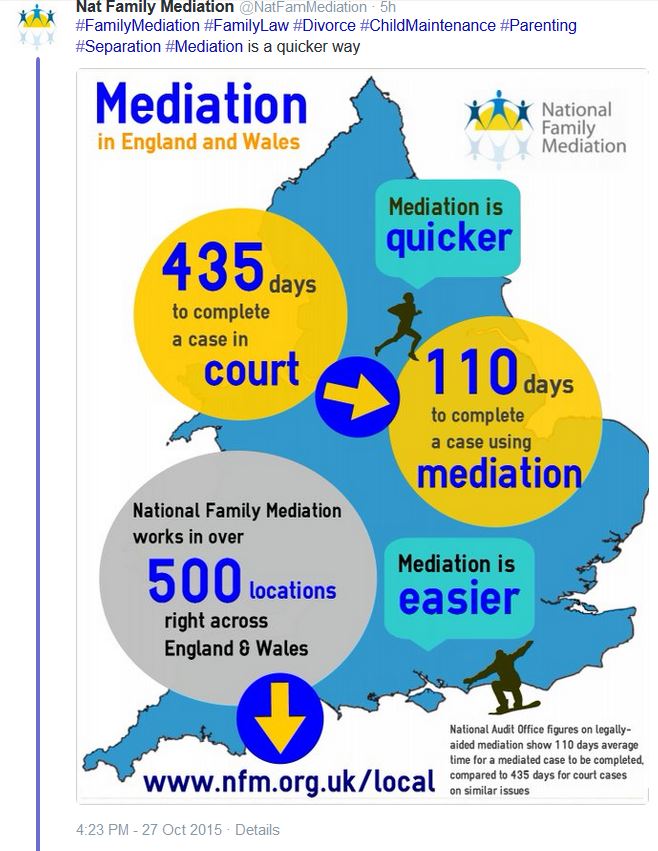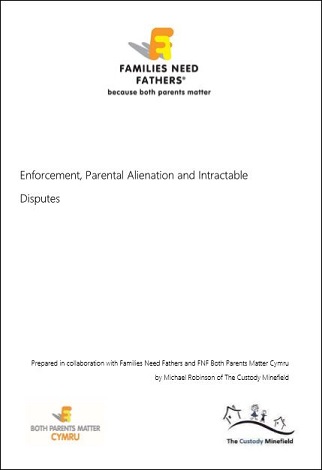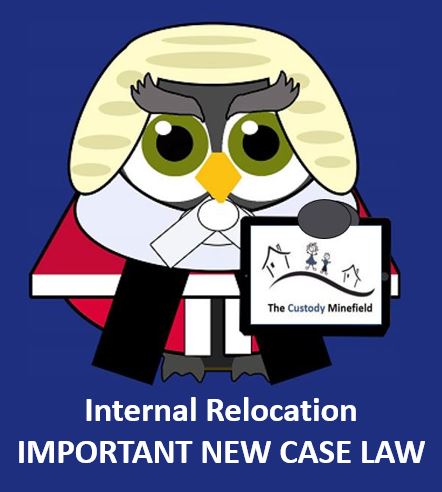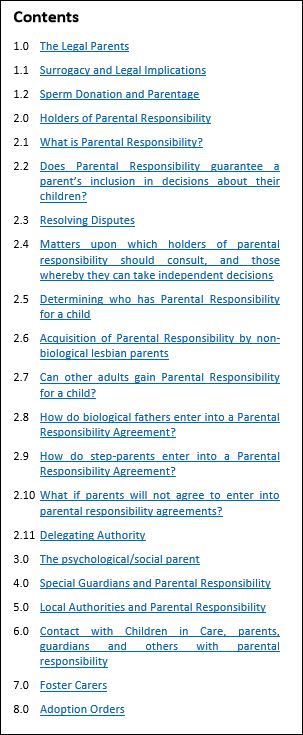Last week we wrote about the length of private family law proceedings (by type of representation) following the Ministry of Justice publishing their latest quarterly statistics. Their April to June 2015 quarterly bulletin gave the average length of time to conclude a case as being 14.7 weeks (102.9 days) in private family law proceedings. In divorce proceedings, the average length of proceedings currently stands at 23.6 weeks (165 days). On Tuesday, National Family Mediation (NFM) was tweeting that it takes 435 days to conclude a case in court. Not unsurprisingly, this had us raising a collective eyebrow.
Before moving to the numbers, we wish to make clear we’re supportive of mediation as a dispute resolution tool, of mediators and promote mediation as an option throughout our guides. Where parties are capable of being reasonable and compromise, we’d agree it’s preferable to court, but there’s the rub. It requires two reasonable parties for mediation to succeed, and when relationships break up, sometimes even the most skilled mediator will not move parents from a selfish, combative and aggressive position. For some cases, such as those involving relocation, a compromise position may not be available.
This is the second time this year that National Family Mediation’s claims and conduct on twitter (and on their web site) has caused us concern. The first was over their announcements during the Minnock case which struck us as inappropriate.

National Family Mediation’s current advert mentions the source of statistics they rely upon (the National Audit Office) but not the period to which they relate. It transpires the statistics are 8-9 years old, published in a 2007 report, which perhaps explains why they’re so far adrift of current MoJ statistics.
Their advert (pictured) implies that it takes 435 days for a court case to conclude, yet the National Audit Office reported on 435 days being from the date of application for legal funding to the submission of the final bill. While this administrative/billing timescale may be indicative of the length of proceedings in 2007, it strikes us as an assumption that the two are the same. Regardless, the figures are plainly very much out-of-date and misleading when suggesting the timescales apply today.
In respect of their web site, they go further and clearly state:
“Couples using NFM typically take just over three months to finalise their divorce or separation, while cases that go to court take four times longer”. {Their emphasis, not ours]
In respect of the 110 days to complete a case using mediation, what the 2007 National Audit Office report actually said was:
“Our analysis of the Commission’s data found that, on average, mediations took 110 days (from the start of mediation to the end of the month in which the mediator sought reimbursement from the Commission). This figure will include some cases which were not resolved, or which reached only partial agreement. Despite that, over 95 per cent of mediations were complete within nine months and all mediations were complete within 12 months.”
Let’s look at that again. Mediation, according to that old report, averaged 110 days to the point of seeking reimbursement (8-9 years ago), albeit there wasn’t a breakdown of whether mediation was successful.
NFM’s claims in adverts aren’t the only problem. Their articles, critical of court proceedings, talk of parents being ‘lured towards a lawyer’s promise of victory‘. Do lawyers ‘promise‘ victory? It’s a foolish one who does, and foolish to claim they do. In the same piece of editorial, NFM’s Chief Executive speaks of it being inevitable that court proceedings will lead to fraud… “In the adversarial nature of the ‘traditional’ way of managing divorce, as they’re egged on by solicitors to achieve a ‘victory’ over their ex, it can’t be a surprise that people are tempted to try to hide assets“. The headline for that article… “Adversarial divorce process bound to lead to fraud“. Really?
Returning to that National Audit Office report, all NFM need to do, for credible advertisements, is to rely on the qualified statements expressed by the authors:
“For suitable cases, mediation can provide faster, cheaper and less adversarial resolution of family disputes than involving the courts”
That would be fair, reasonable and more credible.
Sources:
National Audit Office: Legal Services Commission: ‘Legal aid and mediation for people involved in family breakdown’. 2 March 2007
Ministry of Justice: Family Court Statistics Quarterly: April to June 2015
 Last September I had the opportunity to write a paper on the reform of private family law and specifically related to contact enforcement. The paper was presented to Sir James Munby, President of the Family Court, by officers of Families Need Fathers who had been offered a continuing dialogue by him following his presentation to the charity AGM in 2014. A follow-up meeting is diarised to discuss the paper’s contents and proposals.
Last September I had the opportunity to write a paper on the reform of private family law and specifically related to contact enforcement. The paper was presented to Sir James Munby, President of the Family Court, by officers of Families Need Fathers who had been offered a continuing dialogue by him following his presentation to the charity AGM in 2014. A follow-up meeting is diarised to discuss the paper’s contents and proposals.









